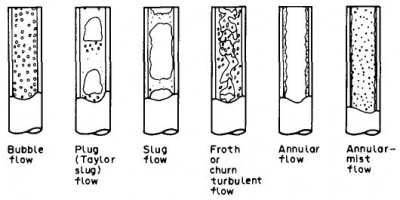Difference between revisions of "Multiphase Gas-Liquid Flow Behavior CFD Simulation in a T-junction Microchannel with Variation in Aspect Ratio and Cross-Sectional Shape with Constant Hydrodynamic Diameter"
Bintangf m (talk | contribs) (→Introduction) |
Bintangf m (talk | contribs) (→Introduction) |
||
| Line 15: | Line 15: | ||
[[File:Sattari Tipe Channel.JPG|400px|thumb|center|'''Figure 1''' Types of micro-channel (Sattari-Nafabajadi et al., 2018)]] | [[File:Sattari Tipe Channel.JPG|400px|thumb|center|'''Figure 1''' Types of micro-channel (Sattari-Nafabajadi et al., 2018)]] | ||
| − | [[File:Vertical flow regime Rouhani.JPG|400px|thumb|center|'''Figure 2 (a)''' Types of flow regime in a vertical micro-channel (Rouhani & Sohal, 1983)]] | + | [[File:Vertical flow regime Rouhani.JPG|400px|thumb|center|'''Figure 2 (a)''' Types of flow regime in a vertical micro-channel (Rouhani & Sohal, 1983)]] [[File:Horizontal flow regime Rouhani.JPG|400px|thumb|center|'''Figure 2 (b)''' Types of flow regime in a horizontal micro-channel (Rouhani & Sohal, 1983)]] |
| − | |||
| − | [[File:Horizontal flow regime Rouhani.JPG|400px|thumb|center|'''Figure 2 (b)''' Types of flow regime in a horizontal micro-channel (Rouhani & Sohal, 1983)]] | ||
==Methodology== | ==Methodology== | ||
Revision as of 17:16, 3 December 2020
Authored by
Bintang Farhan Muhammad, Department of Mechanical Engineering, University of Indonesia
Contents
Synopsys
Microchannel has been widely used for the purpose of mixing of a multiphase flow. Several factors has been known in which determines the performance of mixing in microchannel, including the flow regime and operational parameters. Past research found that fluid velocity and slug length has an effect to the mass transport coefficient inside the flow regime. The flow regime itself is also affected by the geometry of the microchannel. However, according to a review written by Sattari-Nafabajadi et al. (2018), researches on the effect of microchannel size are not sufficient to decide whether it is worthy enough to decrease the cross-sectional area to increase mixing performance in compromise of the pressure drop. Other than that, the aspect ratio, which regarded as the effective parameter on the manufacturing expenses, was not investigated in depth in the past research. Therefore, it is necessary to find the influence of aspect ratio and other geometrical parameters to the flow regime and characteristics. This research aims to simulate using CFD the affect of aspect ratio to axial dispersion and pressure drop in a T-junction microchannel with several cross-sectional shapes. The cross sectional shapes to be included in this research is the square, circle, and trapezoidal shape. Hopefully, findings in this research will help to give suggestion on the effective geometrical parameters for microchannels and give insights for further experimental research.
Abstract
N/A


